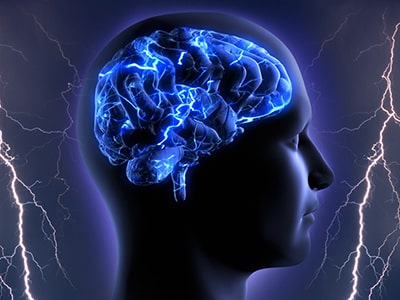Ayurvedic Treatment of Epilepsy

ABOUT EPILEPSY
It is also known as falling sickness. Epilepsy is a neurological disorder that affects central nervous system in which activity of nerve cell in brain is disturbed. In this disorder seizures or periods of unusual behavior, sensations and sometimes loss of consciousness is occurred.
A seizure is a disturbance in the normal regulation of brain. It is the disturbance of electrical activity in brain. Seizure occurs when nerve cells or neuron send wrong message to brain. The symptoms of seizures can vary from person to person. Common feature is spreading wave of uncontrolled electrical activity.
THERE ARE TWO MAIN TYPES OF SEIZURES:-
1. GENERALIZED SEIZURES
It generally begins with sudden abnormal electrical activity throughout the entire brain. This type of seizure includes: tonic clonic convulsions (grand mal) and absence seizures (petit mal or staring seizures).
2. PARTIAL SEIZURES
It begins with abnormal electrical activity in just one part of brain. This activity can spread to other parts as well. It includes: simple partial seizure, complex partial seizure and secondarily generalized seizure.
AYURVEDIC VIEW OF EPILEPSY
In Ayurveda Epilepsy is known as Apasmara and the epileptic attacks are known as Akshpaka. According to Ayurveda, epilepsy is categorized into four types depending upon which type of Dosha is vitiated.
As epilepsy which results due to aggravation of Vata dosha is known as Vataja epilepsy, aggravation of Kapha dosha is known as Kaphaja epilepsy, aggravation of Pitta dosha is known as Pittaja epilepsy and aggravation of all three doshas is known as Sannipataja epilepsy.
SYMPTOMS OF EPILEPSY
Symptoms vary depending upon the type of seizure. In most cases, a person with epilepsy will tend to have same type of seizure each time. So symptoms will be similar from episode to episode. Some common sign and symptoms may include:
- Sudden jerks in arms
- Strange feeling
- Sudden blackout & fainting
- Stiffness in muscles
- Twitching or trembling of muscle
- Psychic symptoms
WHEN TO SEE A DOCTOR
If you may have following symptoms occurs then you may seek a medical help:
- Seizure may last for longer duration i.e. more than five minutes
- Breathing or consciousness doesn’t recover after seizure attack stops
- Immediately second seizure follows
- Pregnancy
- High fever
- Any injury due to seizure
CAUSES OF EPILEPSY
The clear cause of epilepsy is not known. Typically the common known cause of seizure is some injury to the brain. Some of the main causes of epilepsy include:
- Low oxygen during birth
- Brain tumor
- Infections such as meningitis and encephalitis
- Stroke
- Any type of brain damage
- Genetic conditions those results in brain injury such as tuberculosis
- Prenatal injury
RISK FACTORS OF EPILEPSY
Certain factors may increase risk of epilepsy:
- Age – Epilepsy is more common in early childhood or after the age of 60.
- Family History– Family history of epilepsy increased the risk of epilepsy.
- Head Injuries– Head injuries are also responsible for some types of seizures.
- Stroke and other brain infections
- Dementia
COMPLICATIONS
If seizures are left untreated then it may be dangerous to yourself or others:
- Falling – It may be due to head injury or bone breakage
- Drowning
- Car accidents – If seizures occurred during driving then it may leads to car accidents
- Pregnancy complications
DIAGNOSIS OR TESTS
To diagnose this condition, doctor will review symptoms and medical history of patient. There are several tests to diagnose the cause of seizures.
- Neurological examination – It helps to review patient’s behavior, motor abilities, mental function and the type of epilepsy.
- Blood tests – Blood tests diagnose the signs of infections, genetic conditions or other conditions that may be associated with seizures.
- Electroencephalogram (EEG) – It is the most common test to diagnose epilepsy. In this test, doctors attach electrode to patient’s scalp with paste like substance and these electrodes record electrical activity of brain. It helps to diagnose what type of seizure you have.
- Computerized tomography scan (CT) – CT scan is done to check the cross-sectional images of brain which helps to reveal abnormalities in brain that cause seizures.
- Magnetic resonance imaging (MRI) – creates detailed view of brain which is helpful to detect abnormalities in brain that may be responsible for seizures.
- Functional MRI (fMRI) – helps to measure the change in blood flow that occur in specific part of brain. It is used to detect the exact locations of critical functions such as speech and movement.
- Positron emission tomography (PET) – includes a small amount of low dose radioactive material which is injected into vein that helps to visualize active areas of brain and detect abnormalities.
- Neuropsychological tests – helps to assess patient’s thinking, memory and speech skills. It helps to find out which area is more affected.
HERBAL REMEDIES FOR EPILEPSY
According to Ayurveda epilepsy is known as Apasmara. Planet Ayurveda provides effective herbal remedies such as Brahmi Capsules, Ashwagandha Capsules & Stress Support for ayurvedic treatment of epilepsy. These herbal remedies are prepared from using best quality herbs and strictly follow the principles of Ayurveda. All these herbal remedies of Planet Ayurveda are 100 percent pure, natural and vegetarian. These are free from chemicals, additives and preservatives. These are safe to use as these are free from side effects.
1. BRAHMI CAPSULES
These herbal capsules are obtained from standardized extract of herb Bacopa monnieri. It is small annual creeping herb which is found throughout India including Northern Eastern Region. The whole plant is used to make medicines.
USES:-
- It nourishes brain and helps in bringing coordination between nervous system and daily activity.
- Brahmi acts as brain tonic.
- It is also helpful in treatment of epilepsy, insomnia.
- The capsule is helpful in all type of mood disorders. It is also helpful in relieving anxiety, stress and mental fatigue.
Pack Size – Each bottle contains 60 capsules.
Dose – 1-2 Capsules twice daily after meal with plain water.
2. ASHWAGANDHA CAPSULES
These are pure natural capsules that are obtained from Withania somnifera (Ashwagandha). It is cultivated in drier region of India. This herb is nontoxic that works on nonspecific basis to normalize physiological function working on HPA axis and neuroendocrine system.
USES:-
- It possesses natural rejuvenative properties to the body.
- These capsules are also used in fatigue, stress and weakness.
Pack Size – 60 capsules in a bottle.
Dose – 1-2 Capsules twice daily, with plain water, after meals.
3. STRESS SUPPORT
Stress support capsules are mixture of extract of natural ingredients named as Ashwagandha (Withania somnifera), Tagar (Valeriana wallichii) & Brahmi (Bacopa monnieri).
A) Ashwagandha (Withania somnifera) : It is also known as Indian ginseng.
USES:-
- It is very beneficial for the nervous system.
- This herb possesses anti-inflammatory, anti-stress, immuno-modulatory & antioxidant properties.
- Ashwagandha improves mental and physical performance.
B) Tagar (Valeriana wallichii) : It is also called Indian valerian belongs to family valerianaceae which is native to India, Nepal and China.
USES:-
- It calms down nervous system.
- Tagar helps to relieve stress, depression and anxiety.
C) Brahmi (Bacopa monnieri): It is perennial creeping herb belongs to family Plantaginaceae. Brahmi is native to wetlands of Southern India, Australia, Europe, Asia, Africa, North and South America.
USES:-
- It has positive effect on nervous system.
- Regular use of Brahmi is beneficial in epilepsy.
- It enhances physical and mental performance.
- The herb is quite useful in various mental illnesses.
Pack Size : 60 capsules in a bottle.
Dose : 1-2 capsules twice daily with plain water after meal.
DIET AND LIFESTYLE
There are some guidelines in daily diet and lifestyle which are beneficial in the management of epilepsy. These are as following:
- Patient should take proper rest.
- Eat proper & healthy diet.
- People should avoid drugs and alcohol.
- Meditation and relaxation techniques should be used regularly to ensure that stress does not disturb the electrical activities in the brain.
- Doing yoga, Pranayama regularly have positive effect on nervous system and helps to cure epilepsy along with treatment.






